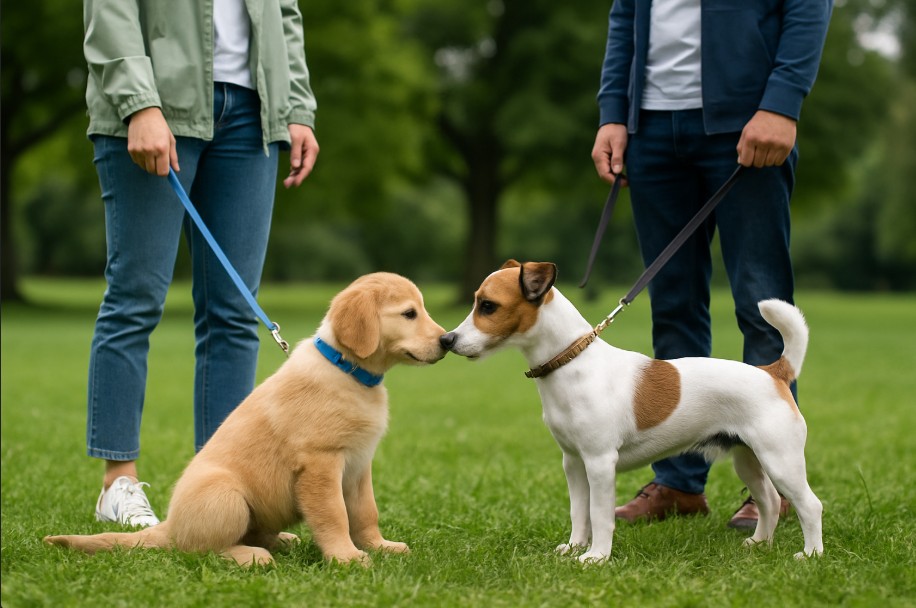No - it’s never too late to socialize a dog.
While the most critical window for socialization is between eight weeks and four months, dogs are lifelong learners. Adult dogs can absolutely adapt and gain confidence through gentle, positive exposure to new people, environments, and experiences.
The key difference is how you go about it - older dogs require more patience, structure, and sensitivity to past experiences.

During early puppyhood, a dog’s brain is like a sponge - rapidly forming associations. Positive interactions during this time build the foundation for a confident, curious temperament.
After four months, dogs become more cautious of new things, which is why socialization takes longer later in life. But with positive reinforcement and controlled exposure, older dogs can still form new, healthy associations.
Many rescue or rehomed dogs were never properly socialized as puppies - and that’s okay. Dogs are remarkably resilient. With time and care, they can:
Socialization at any age improves mental health, adaptability, and emotional balance - and often strengthens your bond, too.
Begin in calm, quiet settings - your home, backyard, or a quiet street. Avoid crowded parks or busy trails at first.
Let your dog observe new people, sounds, or objects from a safe distance before any direct interaction.
Use treats, praise, or play to create positive associations. For example:
This turns unfamiliar experiences into “good things happen” moments.
Watch for signs of stress such as a tucked tail, yawning, shaking, or avoiding eye contact.
If your dog seems overwhelmed, back off and slow the pace. Progress should feel safe, not forced.
Once your dog is comfortable at home, explore:
Small successes build lasting confidence.
For fearful or reactive dogs, work with a certified positive-reinforcement trainer or join a controlled socialization class.
A professional can design customized desensitization plans and help your dog re-learn comfort around triggers like strangers, loud noises, or other pets.
Think of socialization as an ongoing practice, not a one-time event.
Even confident adult dogs benefit from:
Ongoing exposure keeps your dog curious, adaptable, and mentally stimulated - key traits for a happy Canadian companion.
Older dogs may progress slower - but every step counts.
Celebrate small wins like calmly passing another dog or relaxing during a walk. With time, your dog’s world expands, and so does their confidence.
Many Canadian rescues have shared inspiring transformations.
Dogs who once cowered in shelters now confidently stroll through busy markets - proof that love, trust, and time can rewrite a dog’s story.
It’s never too late to teach your dog that the world is a safe, friendly place.
Whether you’re starting with a shy rescue or an adult dog new to city life, remember: consistency and compassion matter more than age.
Socialization is about helping your dog feel calm, curious, and connected - one positive experience at a time.
Hit the trails with confidence! Our guide to the best dog leashes for hiking in Canada breaks down the top leash types - from hands-free to reflective - and shares expert tips for safe, comfortable adventures with your pup. Featuring trusted Canadian gear from Rocky Mountain Dog, this post helps you choose durable, trail-tested leashes built for every season and terrain.
Discover why Labradors thrive on fresh, whole-food meals tailored to their active lifestyle. This guide breaks down the best fresh dog food options for Labrador Retrievers in Canada, explains why balanced nutrition matters, and highlights top NutriCanine recipes made with human-grade ingredients. Learn how to transition your Lab safely to fresh food, manage their calories, and support long-term health - all while keeping mealtime easy and convenient with Canadian delivery from NutriCanine.
This article explores the best greeting exercises to stop dogs from jumping, barking, or biting when meeting people. It explains why dogs act out during greetings - often from excitement or overstimulation - and provides step-by-step training tips to promote calm behavior.
Discover practical and creative ways to keep your dog active indoors this winter. From games and training to DIY enrichment, keep your Canadian pup happy and healthy no matter how low the temperature drops.
When winter hits, knowing your dog’s limits is key. This vet-informed guide explains how cold is too cold for different breeds, the warning signs of overexposure, and simple tips to keep your pup warm and safe during chilly walks.